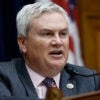
Last week, Congress rushed to infuse an additional $2 billion into the “Cash for Clunkers” program on the grounds that it is wildly popular. “I’d like to see that program extended…I hope we can get it done,” stated Sen. Dick Durbin (D-IL). “I think the last thing any politician wants to do is cut off opportunity for somebody who wants to get a rebate to buy a new automobile,” stated Transportation Secretary Ray LaHood.
Durbin and LaHood were not alone in their sentiments. According to the Associated Press, Vice President Joe Biden said the program is an “unqualified success”:
I think it would be hard to tell…the thousands of people who have just traded in gas guzzlers for more efficient cars that this is having no impact.
If, as the “Clunkers” paradigm suggests, popularity is the metric by which success is determined, politicians should be scrambling to reauthorize the D.C. Opportunity Scholarship program. Since 2004, more than four students have applied for each available scholarship, substantiating the popularity of the program.
Unfortunately, the popularity of the D.C. Opportunity Scholarship program – which provides scholarships of up to $7,500 for more than 1,700 low-income children in D.C. to attend a safe and effective private school of their choice – seemed to be of little concern to those same members who saw to create a nearly insurmountable hurdle to the program’s continuation. Senator Dick Durbin went out of his way to try to kill the $12 million scholarship program last year by inserting language into the Omnibus bill designed to phase-out the school vouchers.
But a newly released poll of D.C. residents reveals just how popular the scholarship program is to families:
- More than seven out of ten registered voters in the District of Columbia support the federally funded DC Opportunity Scholarship program,
- Seventy-four percent say they either “strongly favor” or “somewhat favor” the scholarship program, and
- A full 79 percent of D.C. parents oppose ending the program.
If popularity is the metric for determining program continuation, members of Congress should certainly look to D.C. residents for guidance.
As our Heritage colleagues James Gattuso and Nick Loris point out however, “There is a difference between popularity and success.” In the case of the D.C. Opportunity Scholarship program, both popularity and success define the program. Students are safer and, in the case of those students who say in the program the longest, are reading up to two years ahead of their peers who remained in D.C. public schools.





























